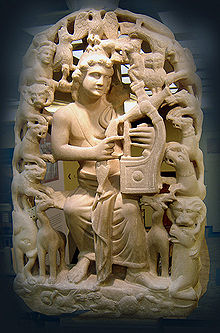Music of ancient Greece
| Music of Greece | |
|---|---|
 |
|
| General topics | |
| Genres | |
| Specific forms | |
| Media and performance | |
| Music awards |
|
| Music charts | |
| Music festivals | |
| Music media |
|
| Nationalistic and patriotic songs | |
| National anthem | "Hymn to Liberty" |
| Regional music | |
| Related areas | Cyprus, Pontus, Constantinople, South Italy |
| Regional styles |
|
The music of ancient Greece was almost universally present in their society, from marriages, funerals, and religious ceremonies to theatre, folk music, and the ballad-like reciting of epic poetry. It thus played an integral role in the lives of ancient Greeks. There are significant fragments of actual Greek musical notation as well as many literary references to ancient Greek music, such that some things can be known—or reasonably surmised—about what the music sounded like, the general role of music in society, the economics of music, the importance of a professional caste of musicians, etc. Even archaeological remains reveal an abundance of depictions on ceramics, for example, of music being performed.
The word music comes from the Muses, the daughters of Zeus and patron goddesses of creative and intellectual endeavours.
Music played an integral role in ancient Greek society. Pericles' teacher Damon said, according to Plato in the Republic, "when fundamental modes of music change, the fundamental mores of the state change with them." Music and gymnastics comprised the main divisions in one's schooling. "The word 'music' expressed the entire education".
In Greek mythology: Amphion learned music from Hermes and then with a golden lyre built Thebes by moving the stones into place with the sound of his playing; Orpheus, the master-musician and lyre-player, played so magically that he could soothe wild beasts; the Orphic creation myths have Rhea "playing on a brazen drum, and compelling man's attention to the oracles of the goddess"; or Hermes [showing to Apollo] "...his newly-invented tortoise-shell lyre and [playing] such a ravishing tune on it with the plectrum he had also invented, at the same time singing to praise Apollo's nobility that he was forgiven at once..."; or Apollo's musical victories over Marsyas and Pan.
...
Wikipedia
